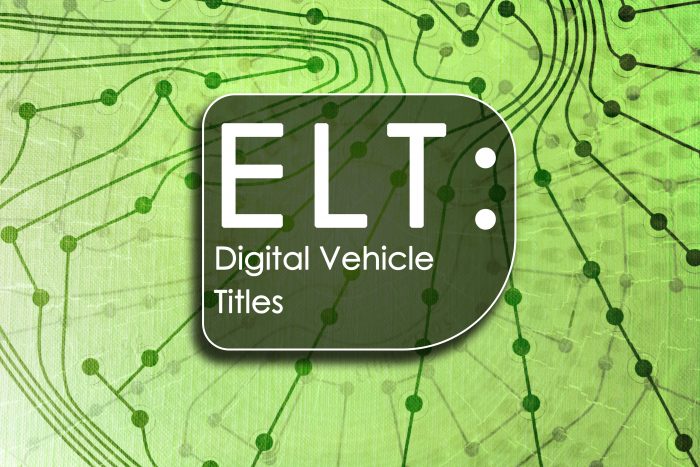ELT: Digital Vehicle Titles

The Internet of Things has extended to so many things in our everyday lives. The idea behind the conversion is to increase convenience for quick, painless transactions. Within the last few years, states have begun using an electronic title instead of a paper title.
Not all states participate yet, while others require you to have an electronic title. Whether the ELT is mandatory or optional depends on your state’s guidelines. The new electronic title program is called ELT, or Electronic Lien and Title, or e-title programs.
The e-title is a digital record that replaces the paper copy of your title. The document serves the same purpose, to show ownership of the vehicle. The title contains personal information about the owner of the vehicle. The ELT system transmits information between lenders and the Department of Motor Vehicles (DMV.) The lien holders that are listed on titles are able to communicate digitally with the DMV. As a result of this system, paperless transactions can be used for the addition/deletion of lien holders on a title.
If you finance your vehicle when you purchase it, the lender will be listed on your title as a lien holder until the loan is paid off. The title will be held by the lien holder in digital format, if your state participates. Once you pay off the loan in full, the lien holder will submit a release of the lien to the DMV. Once this is complete, the lien holder is deleted from the title and an updated certificate is created. This makes the transaction faster.
Advantages of ELT:
- Most companies have embarked on the journey of going paperless. One of the most obvious advantages is the positive impact on the environment this action could have
- Reducing the amount of storage space needed
- Ease of access to records
- Helps prevent loss of paper title
- Quicker to send titles digitally
- Helps reduce fraudulent activities
Disadvantages of ELT:
- If an owner wants to sell the vehicle, there may be a waiting period while the digital copy is transferred into a paper copy to be mailed out.
- Not having a physical copy on hand when needed.
Fortunately, you can make a trip to the DMV to order a copy of your title. However, there is a fee. The cost ranges depending on your state. In Colorado, for example, it’s $20 to receive a copy of your title. Does your state participate in ELT?
Do you have questions about your insurance? Find an insurance agent near you with our Agent Finder
Search All Blogs
Search All Blogs
Read More Blogs
The Mystery of the Plastic Baby: A Guide to Mardi Gras and the King Cake
Why is there a baby in the cake? Discover the history and traditions of Mardi Gras 2026 and the delicious mystery of the King Cake.
Let the Good Times Roll—Safely: Mardi Gras Liability for Your Business
Hosting a Mardi Gras party this Tuesday? Make sure your business has the right event liability and liquor coverage before the beads start flying.
The Business “Prenup”: Why Business Partners Need Life Insurance in February
Love your business partner? Protect your company with a Life Insurance-funded Buy-Sell agreement to ensure the business survives the unexpected.
Heading South? Insuring Your Mid-Winter Break Road Trip in February
Driving to find some sun this week? Check your roadside assistance and rental car coverage before you leave the driveway.
Spring Dreams, Winter Schemes: Updating Your Insurance Before Your Spring Renovation
Planning a Spring kitchen remodel? Learn why you need to call your insurance agent before the contractors arrive to ensure your project is covered.
Shadow or Spring? The Quirky Science and Folklore of Groundhog Day 2026
Will he see his shadow? Dive into the history and humor of Groundhog Day 2026 and why we still trust a rodent with our weather forecasts.
Stocked for Love: Protecting High-Value Valentine’s Inventory with Business Insurance
Is your Valentine’s stock protected? Ensure your business insurance accounts for the massive inventory surge happening in early February.
New Life, New Responsibility: Why a February Arrival Means Updating Your Policy
Welcoming a new family member this February? It’s time to move life insurance to the top of your to-do list to ensure your child’s future is secure.
Delivering Love: The Insurance Risks of Valentine’s Week Gig Work
Delivering flowers or chocolates for extra cash this Valentine’s? Make sure your car is actually insured for delivery work before you hit the road.
Tax Prep & Protection: Ensuring Your Home Office is Fully Insured for 2026
Prepping your taxes? Don’t forget to check your home office insurance. Your standard policy might not cover your professional gear or liability.










